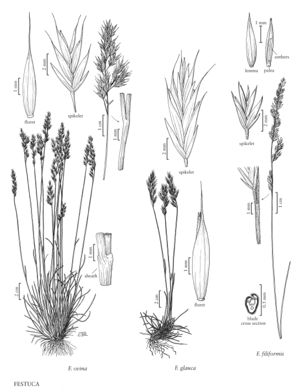Difference between revisions of "Festuca filiformis"
FNA>Volume Importer |
FNA>Volume Importer |
||
| Line 23: | Line 23: | ||
-->{{Treatment/Body | -->{{Treatment/Body | ||
|distribution=Wash.;D.C;N.H.;N.J.;N.C.;Tenn.;N.Y.;Pa.;Alta.;B.C.;N.B.;Nfld. And Labr.;N.S.;Ont.;P.E.I.;Que.;R.I.;S.C.;W.Va.;Va.;Vt.;Ill.;Ind.;Conn.;Maine;Md.;Mass.;Ohio;Mich.;Mont.;Wis.;Miss.;Oreg. | |distribution=Wash.;D.C;N.H.;N.J.;N.C.;Tenn.;N.Y.;Pa.;Alta.;B.C.;N.B.;Nfld. And Labr.;N.S.;Ont.;P.E.I.;Que.;R.I.;S.C.;W.Va.;Va.;Vt.;Ill.;Ind.;Conn.;Maine;Md.;Mass.;Ohio;Mich.;Mont.;Wis.;Miss.;Oreg. | ||
| − | |discussion=<p | + | |discussion=<p>Festuca filiformis is a European species that has been introduced to the Flora region as a turf grass. It grows well on poor, dry soils and is becoming a ruderal weed in some areas. It is particularly common in the northeastern United States and southeastern Canada, but has been reported from scattered locations elsewhere.</p> |
|tables= | |tables= | ||
|references= | |references= | ||
| Line 39: | Line 39: | ||
|basionyms= | |basionyms= | ||
|family=Poaceae | |family=Poaceae | ||
| + | |illustrator=Cindy Roché | ||
|distribution=Wash.;D.C;N.H.;N.J.;N.C.;Tenn.;N.Y.;Pa.;Alta.;B.C.;N.B.;Nfld. And Labr.;N.S.;Ont.;P.E.I.;Que.;R.I.;S.C.;W.Va.;Va.;Vt.;Ill.;Ind.;Conn.;Maine;Md.;Mass.;Ohio;Mich.;Mont.;Wis.;Miss.;Oreg. | |distribution=Wash.;D.C;N.H.;N.J.;N.C.;Tenn.;N.Y.;Pa.;Alta.;B.C.;N.B.;Nfld. And Labr.;N.S.;Ont.;P.E.I.;Que.;R.I.;S.C.;W.Va.;Va.;Vt.;Ill.;Ind.;Conn.;Maine;Md.;Mass.;Ohio;Mich.;Mont.;Wis.;Miss.;Oreg. | ||
|reference=None | |reference=None | ||
| Line 44: | Line 45: | ||
|publication year= | |publication year= | ||
|special status= | |special status= | ||
| − | |source xml=https:// | + | |source xml=https://bibilujan@bitbucket.org/aafc-mbb/fna-data-curation.git/src/314eb390f968962f596ae85f506b4b3db8683b1b/coarse_grained_fna_xml/V24/V24_601.xml |
|subfamily=Poaceae subfam. Pooideae | |subfamily=Poaceae subfam. Pooideae | ||
|tribe=Poaceae tribe Poeae | |tribe=Poaceae tribe Poeae | ||
Revision as of 17:08, 30 October 2019
Plants densely cespitose, with¬out rhizomes. Culms 18-40(60) cm, mostly scabrous or puberulent below the inflorescence. Sheaths closed for less than 1/3 their length, smooth or scabrous, glabrous or finely puberulent, persistent; collars glabrous; ligules 0.1-0.4 mm; blades 0.2-0.4(0.6) mm in diameter, conduplicate, abaxial surfaces smooth, adaxial surfaces scabrous, veins 5(7), ribs 1, distinct; abaxial sclerenchyma forming a continuous or almost continuous band; adaxial sclerenchyma absent. Inflorescences 1-6(14) cm, usually contracted, with 1-2 branches per node; branches usually erect, lower branches with 2+ spikelets. Spikelets 3-6(6.5) mm, with 2-6(8) florets. Glumes exceeded by the upper florets, ovate-lanceolate to lanceolate, glabrous; lower glumes 1-2.5 mm; upper glumes (1.7)2-3(3.9) mm; lemmas 2.3-4(4.4) mm, obtuse to acute, mostly smooth and glabrous, sometimes scabrous or pubescent distally, unawned, sometimes mucronate, mucros to 0.4 mm; paleas about as long as the lemmas, intercostal region smooth or scabrous distally; anthers (1)1.5-2.2 mm; ovary apices glabrous. 2n = 14 (28).
Distribution
Wash., D.C, N.H., N.J., N.C., Tenn., N.Y., Pa., Alta., B.C., N.B., Nfld. And Labr., N.S., Ont., P.E.I., Que., R.I., S.C., W.Va., Va., Vt., Ill., Ind., Conn., Maine, Md., Mass., Ohio, Mich., Mont., Wis., Miss., Oreg.
Discussion
Festuca filiformis is a European species that has been introduced to the Flora region as a turf grass. It grows well on poor, dry soils and is becoming a ruderal weed in some areas. It is particularly common in the northeastern United States and southeastern Canada, but has been reported from scattered locations elsewhere.
Selected References
None.
